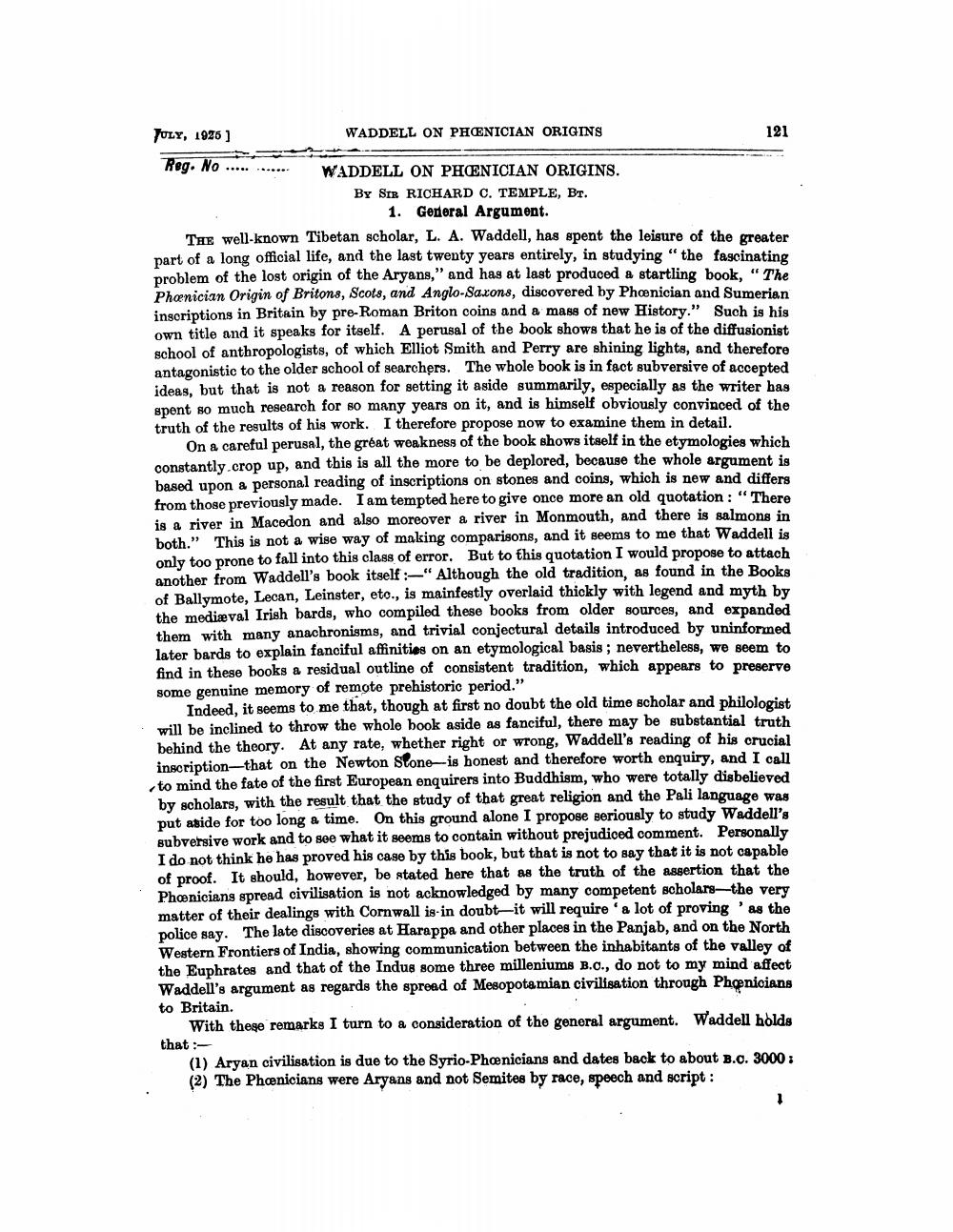________________
JULY, 1925) WADDELL ON PHENICIAN ORIGINS
121 Reg. No .........
WADDELL ON PHENICIAN ORIGINS. BY SIR RICHARD C. TEMPLE, Br.
1. General Argument. THE well-known Tibetan scholar, L. A. Waddell, has spent the leisure of the greater part of a long official life, and the last twenty years entirely, in studying "the fascinating problem of the lost origin of the Aryans," and has at last produced a startling book,"The Phænician Origin of Britons, Scots, and Anglo-Saxons, discovered by Phoenician and Sumerian ingeriptions in Britain by pre-Roman Briton coins and a mass of new History." Such is his own title and it speaks for itself. A perusal of the book shows that he is of the diffusionist school of anthropologists, of which Elliot Smith and Perry are shining lights, and therefore antagonistic to the older school of searchers. The whole book is in fact subversive of accepted ideas, but that is not a reason for setting it aside summarily, especially as the writer has spent so much research for so many years on it, and is himself obviously convinced of the truth of the results of his work. I therefore propose now to examine them in detail.
On a careful perusal, the great weakness of the book shows itself in the etymologies which constantly.crop up, and this is all the more to be deplored, because the whole argument is based upon a personal reading of inscriptions on stones and coins, which is new and differs from those previously made. I am tempted here to give once more an old quotation : "There is a river in Macedon and also moreover & river in Monmouth, and there is salmons in both." This is not a wise way of making comparisons, and it seems to me that Waddell is only too prone to fall into this class of error. But to this quotation I would propose to attach another from Waddell's book itself -"Although the old tradition, as found in the Books of Ballymote, Lecan, Leinster, etc., is mainfestly overlaid thickly with legend and myth by the medieval Irish bards, who compiled these books from older sources, and expanded them with many anachronisms, and trivial conjectural details introduced by uninformed later bards to explain fanciful affinities on an etymological basis ; nevertheless, we seem to find in these books a residual outline of consistent tradition, which appears to preserve some genuine memory of remoto prehistoric period."
Indeed, it seems to me that, though at first no doubt the old time scholar and philologist will be inclined to throw the whole book aside as fanciful, there may be substantial truth behind the theory. At any rate, whether right or wrong, Waddell's reading of his crucial inscription--that on the Newton Stone-is honest and therefore worth enquiry, and I call to mind the fate of the first European enquirers into Buddhism, who were totally disbelieved by scholars, with the result that the study of that great religion and the Pali language was put aside for too long a time. On this ground alone I propose seriously to study Waddell's Bubversive work and to see what it seems to contain without prejudiced comment. Personally I do not think he has proved his case by this book, but that is not to say that it is not capable of proof. It should, however, be stated here that as the truth of the assertion that the Phoenicians spread civilisation is not acknowledged by many competent scholars—the very matter of their dealings with Cornwall is in doubt-it will require a lot of proving 'as the police gay. The late discoveries at Harappa and other places in the Panjab, and on the North Western Frontiers of India, showing communication between the inhabitants of the valley of the Euphrates and that of the Indus some three milleniums B.O., do not to my mind affect Waddell's argument as regards the spread of Mesopotamian civilisation through Phoenicians to Britain.
With these remarks I turn to a consideration of the general argument. Waddell holds that :
(1) Aryan civilisation is due to the Syrio-Phoenicians and dates back to about B.O. 3000 : (2) The Phænicians were Aryans and not Semites by race, speech and script :




